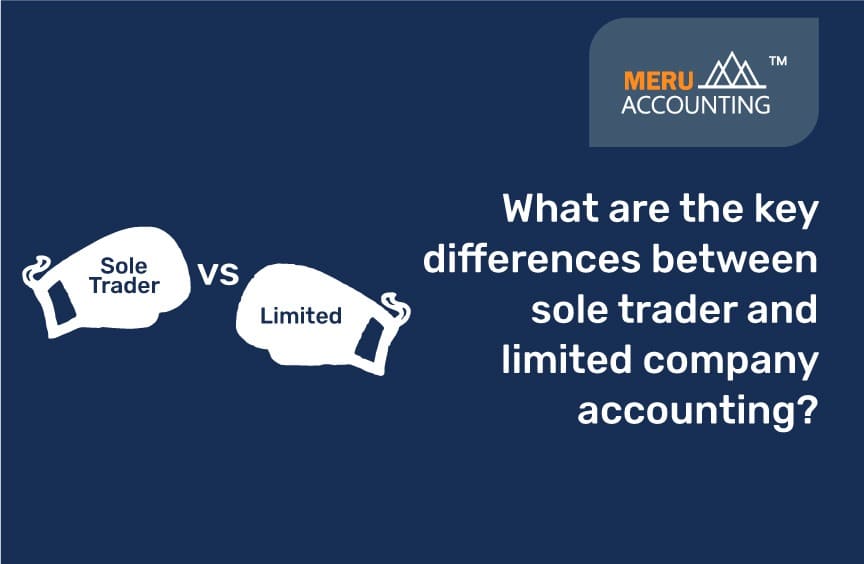
What are the key differences between sole trader and limited company accounting?
Deciding whether to operate as a sole trader or a limited company is a major decision that can significantly impact your accounting processes and overall business operations. Understanding the differences will help you choose the best structure for your business, especially when considering the services of a sole trader accountant. Here’s a detailed breakdown of the key distinctions between sole trader accounting and limited company accounting business structures.
Differences between sole trader and limited company accounting
1. Structure and Liability
Sole Trader: As a sole trader, you and your business are considered the same legal entity. This means you’re personally responsible for all business debts and liabilities, which can put your personal assets, such as your home and savings, at risk. This structure is straightforward and easy to manage, but the personal risk can be a major downside.
Limited Company: A limited company is a separate legal entity, meaning your personal assets are protected. Your liability is limited to the amount you invest in the company, making this structure appealing for those who want to minimize personal risk. However, running a limited company comes with more complex accounting and legal responsibilities.
2. Taxation
Sole Trader: As a sole trader, you are taxed on your total business profits through income tax and National Insurance contributions. This can lead to higher tax rates as your earnings increase. Working with a dedicated sole trader accountant can help you maximize tax efficiency, find allowable expenses, and navigate the tax system smoothly, making sole trader accounting simpler and more manageable.
Limited Company: Limited companies pay corporation tax on their profits, which can often be a lower rate compared to personal income tax. Shareholders then pay personal tax on any salary or dividends taken from the company. This setup can offer more tax efficiency, particularly for businesses earning higher profits, but requires careful planning to ensure compliance with all tax obligations.
3. Administrative Responsibilities
Sole Trader: Sole trader accounting involves fewer administrative tasks compared to a limited company. You are required to keep basic financial records and file an annual self-assessment tax return. This makes the structure appealing for those looking for less paperwork and easier day-to-day management.
Limited Company: In contrast, limited companies face stricter administrative responsibilities, including filing annual accounts, submitting a confirmation statement, and maintaining statutory records. These tasks often necessitate hiring an accountant to manage the more detailed bookkeeping and ensure compliance with regulations.

Hire A Dedicated Team
That Grows With You, Flexible, Scalable and
Always On Your Side
4. Financial Record-Keeping
Sole Trader: The record-keeping requirements are simpler and primarily focus on tracking income, expenses, and profits. A sole trader accountant can help keep these records organized, accurate, and compliant with HMRC regulations, ensuring your financial data is always up-to-date and error-free.
Limited Company: Financial record-keeping is more complex and involves maintaining comprehensive accounts of all financial transactions, assets, and liabilities. This level of detail often requires the expertise of an accountant to manage, making sure that your financial statements are correctly prepared and submitted on time.
5. Profit Distribution
Sole Trader: All profits after tax are yours to keep, providing you with full control over your income. This straightforward approach makes managing finances simple but can result in higher personal tax liabilities as profits grow.
Limited Company: Profits can be distributed as dividends to shareholders, which can be a more tax-efficient way of taking income from your business. However, this requires careful planning and an understanding of tax implications, often with the support of an accountant.
6. Perception and Credibility
Sole Trader: Operating as a sole trader is often seen as less formal, which can be a disadvantage in industries where a more professional appearance is beneficial. However, it’s a simple way to start and run a business without needing complex structures or large initial investments.
Limited Company: A limited company is generally perceived as more professional and credible, which can help attract clients and investors. This enhanced perception can provide a competitive edge, particularly in industries where business reputation and formal structure matter.
Choosing between operating as a sole trader or a limited company depends on your business needs, long-term goals, and your comfort with managing administrative tasks. Both structures have their unique advantages and potential drawbacks. If you need expert guidance on managing your business finances, Accounts Junction offers specialized services tailored to your needs. Whether you require help with sole trader accounting or navigating the complexities of operating as a limited company, a professional accountant can provide the support you need to make the best decisions for your business.
